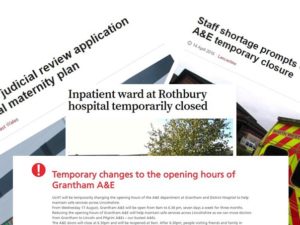News & Insights
Temporary engagement bypass in the NHS
The NHS is undoubtedly under pressure. Barely a day goes by without national headlines proclaiming failures in one part or another of our health and care system. Much of the coverage seems to recognise that things need to change and much of the debate is dedicated to answering the question of how. Just this week during a Parliamentary debate on NHS England’s much publicised local area STPs (Sustainability and Transformation Plans) –expertly summarised by The Consultation Institute — MPs of all parties cited public mistrust of perfunctory consultation and called for real and genuine public involvement right from the start.
But very real staff shortages are bringing some services to the point where they can’t meet safety standards and can’t wait months and months for the STPs to be debated and agreed. I get a consistent stream of questions and queries from NHS clients about temporary changes to services, the kind of change that tends to make headlines only locally, but are no less damaging to valuable relationships if they’re not done right.
One such headline was created last month by United Lincolnshire Hospitals NHS Trust’s decision to reduce the Accident and Emergency department at Grantham and District Hospital from a 24/7 service to one that’s open 9am — 6.30pm each day for a “temporary” three-month period. Another in early September announced the temporary closure of a community hospital in-patient ward in Rothbury, Northumberland. Again for three months.
Clinicians can, quite rightly, make changes to services on safety grounds caused by unexpected, or unpredictable circumstances. We expect our health services to be safe, and if something happens that means standards can’t be maintained, we might not be happy, but we will understand that services have to be temporarily withdrawn.
So how is it that nothing seems to get members of the public reaching for a petition app or painting placards more quickly than the announcement of a temporary change to a cherished local service, be it maternity, A&E, or a community hospital? Indeed, the Grantham announcement has already secured a petition, legal representation, and a four-figure sum in a fund to pay for those lawyers to challenge the decision, and Rothbury campaigners have threatened to “start organising mass demonstrations”.
That patients are passionate about their local health services is never in doubt. Their sense of a right to be involved in decisions is based on a deeply-held feeling of collective ownership of those services. And they know that right is written in law. Clinicians and managers can bypass that right only in situations where they’re satisfied that a decision has to be taken quickly because of a risk to safety or welfare of patients or staff.
And that works where it’s clearly a temporary change for emergency reasons like the short-term closure of Manchester Royal Infirmary A&E last year. Patients understand. Likewise, if for example several of the midwives on which a midwife-led maternity unit is reliant are ill with a vomiting bug the need for an unavoidable closure of a few days is likely to be understood and accepted by local people.
But Grantham has more similarities with the case in Chorley, Lancashire earlier this year where the local MP, Lindsay Hoyle, blamed “bad management” as the cause when Lancashire Teaching Hospitals NHS Trust changed a full A&E service to an urgent care service blaming staff shortages. A director at the local council said he didn’t “understand how the problem in Chorley has become so acute”.
And there, perhaps, is the issue. Could it be a lack of openness that undermines trusting relationships, or the long shadows of previous poor engagement experiences that cause public scepticism?
It’s hard to argue that a staffing issue that has required extra attention for many months is an emergency. It’s equally hard to make the case that a solution that runs into months, or in some cases years, is in any common sense of the word ‘temporary’. It’s particularly difficult where there is local experience of temporary changes that have been extended and extended until they are forgotten by most people and become permanent by default.
Where issues are identified and where thought is given to contingency plans, there is opportunity for public involvement; to share some of the realities of running health services with local people, patients and carers; and to ask for their ideas and support in addressing the issues. There is, in short, the opportunity for stakeholders to influence the decisions that might need to be made.
As always there are areas of grey that can be argued out in court, or settled out of it as with temporary changes to maternity services in North Wales last year, but involving patient reps in contingency planning means patient voices are heard at the point where they can exert influence, and that gives providers a good chance of avoiding the eventuality of legal action.
Making the time to involve patients and the public when a service is in the tightest of corners is an investment in building trusting relationships that will be beneficial time and time again.




